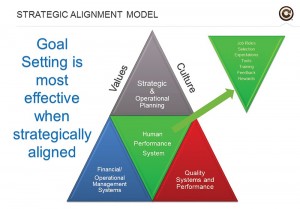
(click for larger image) Figure 1: Goals are an integral part of the human performance system. When goals are aligned with an organization’s values and culture, the employee or team member can see how their goal contributes to the strategic plan of the larger organization.
Source: www.confoe.com
A leader should allow each team member to set individual goals first, Ms. Wright says, and then the leader and team member should jointly discuss why and how to achieve those goals.
Along those same lines, Shawn Casemore, president and founder of the professional empowerment consulting firm Casemore & Co. Inc., in Owen Sound, Ontario, Canada, says that practice owners must develop goals for their employees. However, the only way to obtain employee buy-in is to do so collaboratively by collectively agreeing on objectives and timelines.
Joseph Flahiff, a leadership coach and founder of Whitewater Projects, Inc., in Bothell, Wash., says having employees set goals is a good way to determine if they understand your organization’s objectives. If they do, employers can entrust the employee with more ownership and authority. “Create leaders at every level of an organization, not just at the top,” he says.
Stephen A. Paget, MD, FACP, FACR, MACR, physician-in-chief and chairman of the Division of Rheumatology at the Hospital for Special Surgery in New York, says academic physicians have to achieve certain goals—typically found on a college’s website—in order to move up the academic ladder from instructor to assistant professor, associate professor and full professor.
Help Employees Reach the Stars
Leaders can provide two important things when helping team members accomplish their goals: encouragement and accountability. Provide accountability by checking in with team members periodically and asking how they are doing, but also be quick to encourage them, cheer them on and give them high-fives on their progress. “When you do this, you not only build trust and loyalty with your team member, you motivate them to keep going to complete the goal,” Ms. Wright says.
Michael Fritsch, PMP, president and COO at the consulting and professional services company Confoe in Austin, Tex., says it’s essential to check on how employees are progressing toward achieving their goals by asking them for a weekly update, which he calls a “red, yellow, green approach.” In other words, how confident are they that they will accomplish the goal by the deadline? Do they need help?
For data-driven goals, Mr. Fritsch advises making current performance and performance trends visible to the employee. For example, if an employee wants to set a goal to process a certain number of insurance claims per day, provide them with a chart showing the actual number that is processed daily. If multiple team members process claims, the chart could show the performance of each team member individually so employees can see how they are doing relative to other team members. “An easy, low-tech approach would be to just have an employee write down their number each day and keep a running tally,” Mr. Fritsch says.

